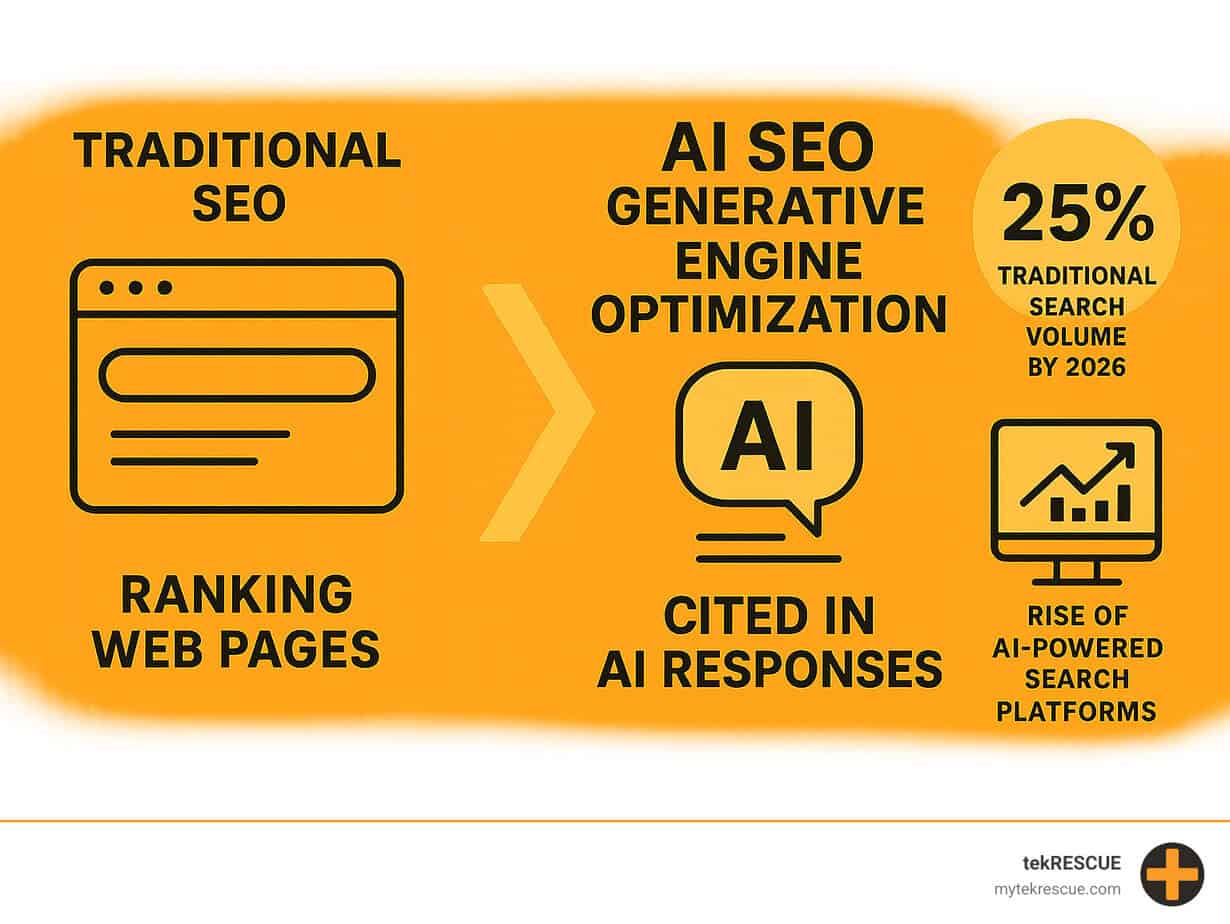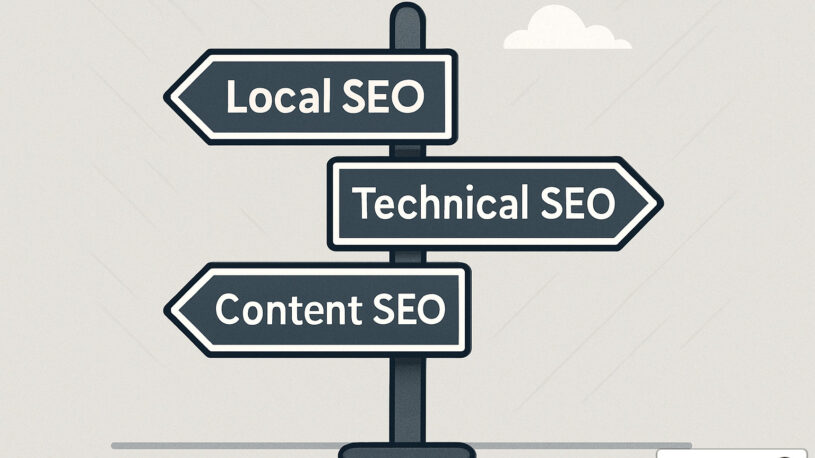

AI SEO Generative Engine Optimization Explained Without the Jargon
Table of Contents
Why AI SEO Generative Engine Optimization is Changing How Businesses Get Found Online
AI SEO Generative Engine Optimization is the practice of optimizing your content so AI-powered search engines like ChatGPT, Google Gemini, and Perplexity can find, understand, and cite your business when answering user questions. Unlike traditional SEO that focuses on ranking web pages, GEO aims to get your content featured directly in AI-generated answers.
Here’s what you need to know about AI SEO Generative Engine Optimization:
- What it is: Optimizing content for AI answer engines instead of just Google search results
- Why it matters: 79% of consumers now use AI-improved search, and traditional search volume is expected to drop 25% by 2026
- How it works: AI engines synthesize information from multiple sources to create comprehensive answers
- Key difference: Success is measured by how often you’re cited in AI responses, not just website clicks
- Main benefit: Higher conversion rates since AI users are further along in their buying journey
The shift is already happening. ChatGPT has over 180 million monthly users, while Perplexity AI’s usage surged 858% in just one year. Meanwhile, traditional search traffic has declined by 10% as people accept AI-powered findy.
The challenge? Most business owners don’t know how to optimize for these new AI search engines. They’re still using old SEO tactics that don’t work when AI is answering questions directly.
That’s where understanding AI SEO Generative Engine Optimization becomes crucial for your business survival.
I’m Randy Bryan, an AI and cybersecurity expert who has helped businesses adapt to technological changes for over two decades, including the recent shift toward AI SEO Generative Engine Optimization strategies. As the founder of tekRESCUE, I’ve seen how businesses that adapt early gain a significant competitive advantage.

AI SEO Generative Engine Optimization Fundamentals
Think of AI SEO Generative Engine Optimization as preparing your content for a conversation rather than a search. When someone asks ChatGPT “What’s the best cybersecurity company in Central Texas?”, the AI doesn’t just show a list of links. Instead, it creates a comprehensive answer by pulling information from multiple sources and synthesizing it into a helpful response.
This fundamental shift changes everything about how we approach online visibility. Traditional SEO was about getting your webpage to rank #1 for “cybersecurity services San Marcos TX.” AI SEO Generative Engine Optimization is about making sure your expertise gets mentioned when AI answers questions about cybersecurity, regardless of which specific keywords someone uses.
The data tells the story clearly: AI search queries average 23 words compared to just 4 words in traditional search. People are having full conversations with AI, asking complex questions like “What should a small business in Texas look for when choosing a cybersecurity provider, and how much should they expect to pay?”
GEO vs. Traditional SEO: Where They Overlap & Diverge
Here’s where AI SEO Generative Engine Optimization gets interesting – it’s not completely different from traditional SEO, but the emphasis has shifted dramatically.
What stays the same:
- High-quality, authoritative content still matters
- E-E-A-T (Experience, Expertise, Authoritativeness, Trustworthiness) principles remain crucial
- Technical website performance affects findability
- User intent drives content strategy
What changes completely:
- Success metrics shift from click-through rates to citation frequency
- Content structure becomes more important than keyword density
- Conversational tone beats keyword-stuffed copy
- Being cited in AI responses matters more than ranking #1
| Traditional SEO | AI SEO Generative Engine Optimization |
|---|---|
| Focus on ranking individual pages | Focus on being cited in AI responses |
| Measure clicks and traffic | Measure reference rates and mentions |
| Optimize for specific keywords | Optimize for conversational queries |
| Target search engine algorithms | Target AI model understanding |
| Success = High SERP position | Success = Frequent AI citations |
The overlap is significant – both approaches value expertise and quality content. However, AI SEO Generative Engine Optimization requires a more nuanced understanding of how AI models process and synthesize information. More info about Web Design & SEO in 2024
How Generative AI Answer Engines Work
Understanding how AI answer engines function is crucial for effective AI SEO Generative Engine Optimization. These platforms – ChatGPT, Google Gemini, Perplexity, and Microsoft Copilot – follow a sophisticated process that’s quite different from traditional search engines.
The AI Answer Engine Process:
- Data Collection: AI models are trained on vast datasets including websites, books, articles, and other text sources
- Query Processing: When someone asks a question, the AI analyzes the intent and context
- Information Retrieval: The system searches through its knowledge base for relevant information
- Synthesis: Multiple sources are combined to create a comprehensive answer
- Citation: The AI provides sources and references for its response
- Optimization: The system learns from user interactions to improve future responses
What makes this powerful is the synthesis step. Instead of showing you 10 blue links like Google, AI engines create original content that answers your specific question. This is why 79% of consumers now trust generative AI search results – they get direct answers instead of having to click through multiple websites.
The Aggarwal study from Princeton, Georgia Tech, and IIT Delhi analyzed over 10,000 queries and found that certain optimization tactics can improve visibility in AI responses by 30-40%. The most effective approaches include:
- Citing credible sources: AI engines prioritize content with proper citations
- Adding statistics: Quantitative data significantly boosts citation rates
- Using quotations: Expert quotes increase authority signals
- Structured formatting: Clear headings and bullet points improve AI comprehension

Key Benefits & Drawbacks of GEO
AI SEO Generative Engine Optimization offers compelling advantages, but it’s not without challenges.
Benefits:
- Higher conversion rates: Users who find you through AI search are typically further along in their buying journey
- Increased reach: Your content can be found through conversational queries you never optimized for
- Improved credibility: Being cited by AI engines positions you as an authority
- Future-proofing: Early adoption gives you a competitive advantage as AI search grows
Drawbacks:
- Reduced direct traffic: When AI answers questions directly, fewer people click through to your website
- Algorithm uncertainty: AI models change frequently, making optimization challenging
- Content saturation: As more businesses adopt GEO, competition for citations increases
- Measurement complexity: Traditional analytics don’t capture AI-driven visibility
The key is understanding that AI SEO Generative Engine Optimization isn’t about replacing traditional SEO – it’s about expanding your digital presence to capture the growing segment of users who prefer AI-powered search.
Implementing GEO: Best Practices, Measurement & Future Outlook
The shift to AI SEO Generative Engine Optimization might seem overwhelming, but the foundation is actually quite familiar. Think of it as having a conversation with your most knowledgeable customer – you want to be clear, helpful, and authoritative without being stuffy or robotic.
Structured data implementation becomes your secret weapon here. Schema markup acts like a translator between your content and AI engines, helping them understand exactly what your business does, where you operate, and what expertise you offer. For a cybersecurity company serving Central Texas, this means clearly marking up your service areas, specialties, and credentials so AI can confidently cite your expertise.
The E-E-A-T principles that Google has emphasized for years become even more critical in AI search. Experience, Expertise, Authoritativeness, and Trustworthiness aren’t just ranking factors anymore – they’re citation factors. AI engines are incredibly good at detecting authentic expertise versus generic content.
Creating conversational content requires a mindset shift from keyword-focused writing to question-focused writing. Instead of optimizing for “cybersecurity services San Marcos,” you’re optimizing for “What should I look for when choosing a cybersecurity provider in Central Texas?”
The emerging llms.txt protocol represents an exciting development in AI SEO Generative Engine Optimization. Similar to how robots.txt helps traditional search engines understand your site structure, llms.txt allows you to guide AI crawlers to your most important content.

Optimization Tactics for Popular AI Platforms
Understanding that each AI platform has its own personality and preferences is crucial for effective AI SEO Generative Engine Optimization.
ChatGPT responds best to conversational, natural content that feels like you’re explaining something to a friend. The key is providing clear, direct answers early in your content while maintaining a helpful tone throughout.
Google Gemini and AI Overviews have a strong preference for well-structured content with comprehensive schema markup. These platforms excel at understanding context and relationships between different pieces of information.
Perplexity AI stands out for its emphasis on credible citations and authoritative sources. This platform wants to see your credentials, your sources, and your data. Including statistics, case studies, and expert credentials significantly improves your chances of being cited by Perplexity.
Claude (Anthropic) appreciates detailed, well-researched content that provides balanced perspectives. This platform tends to favor comprehensive coverage of topics with clear structure and helpful formatting.
The strategy isn’t to optimize for just one platform but to create content that works across all of them. More info about How to Develop and Optimize Content for AI-Powered Search Engines Like ChatGPT
Measuring GEO Success & Proving ROI
Measuring AI SEO Generative Engine Optimization success requires a fundamental shift in how we think about digital marketing metrics. Traditional analytics focused on traffic and rankings, but GEO success is about influence and authority in AI-generated responses.
The reference rate becomes your new north star metric – how often AI engines cite your content when answering relevant questions. This isn’t just about vanity metrics; it’s about capturing mindshare at the exact moment when potential customers are seeking solutions.
Share of voice in AI responses tells you how you’re performing compared to your market position. If you’re a leading cybersecurity provider in your area but rarely get mentioned in AI responses, that’s a clear signal that your GEO strategy needs work.
AI referral traffic represents the direct, measurable impact of your GEO efforts. These visitors are often higher quality than traditional search traffic because they’ve already been pre-qualified by AI engines as seeking exactly what you offer.
Modern measurement tools are evolving to meet these new needs. HubSpot’s AI Search Grader evaluates how well your content is structured for AI consumption, while Ahrefs Brand Radar monitors brand mentions across various AI platforms. Google Analytics 4 can track AI-driven referral traffic with custom events.

Action Plan & Conclusion
The change to AI-powered search isn’t coming – it’s already here, and AI SEO Generative Engine Optimization has become essential for businesses that want to remain visible to their customers. The data tells a compelling story: traditional search volume is declining while AI-powered search grows exponentially, and the businesses adapting now are gaining significant competitive advantages.
Your journey into GEO doesn’t have to be overwhelming. Start by auditing your current content to understand how well it performs in AI search environments. Look for opportunities to restructure existing content with clear headings, conversational language, and authoritative sources.
Implementing structured data should be your next priority. Schema markup acts as a bridge between your expertise and AI understanding, helping engines like ChatGPT and Gemini accurately represent your business when answering customer questions.
The shift to conversational content optimization requires thinking like your customers think. Instead of focusing on specific keywords, consider the full questions your customers ask. Someone researching cybersecurity services in Central Texas might ask, “What should I look for in a cybersecurity provider?” Your content should answer these questions comprehensively and naturally.
Monitoring AI citations becomes crucial for understanding your market position. Set up alerts for brand mentions across AI platforms and track how often your expertise appears in AI-generated responses.
Creating authority content that AI engines want to cite requires demonstrating genuine expertise and providing unique value. This means going beyond generic advice to offer specific insights, case studies, and professional experience that sets your business apart.
At tekRESCUE, we’ve spent over two decades helping businesses in San Marcos, Kyle, Dallas, San Antonio, and throughout Central Texas steer technological changes. The shift to AI-powered search represents one of the most significant changes we’ve witnessed, and we’re already seeing early adopters gain substantial advantages in their markets.
Our comprehensive approach combines cybersecurity expertise with strategic AI consulting and digital marketing to help businesses not just survive but thrive in the AI era. We understand that AI SEO Generative Engine Optimization isn’t just about technology – it’s about positioning your business for long-term success in an AI-driven marketplace.
The businesses investing in GEO now will dominate AI search results tomorrow. Those waiting will find themselves invisible to the growing number of customers who rely on AI for research and decision-making.
Ready to position your business for success in the AI era? Contact tekRESCUE today for a comprehensive consultation on how we can help your business excel with AI SEO Generative Engine Optimization. Our team provides cybersecurity, strategic AI consulting, and digital marketing services to businesses throughout Texas, including San Marcos, Kyle, Dallas, San Antonio, New Braunfels, Fort Worth, Bastrop, Smithville, Manor, and the broader Central Texas and DFW regions.
Visit our website at mytekrescue.com to schedule your free AI readiness audit. Don’t let your competition gain ground while you’re still optimizing for yesterday’s search landscape.
The future of search is conversational, AI-powered, and happening right now. Make sure your business is part of the conversation that matters most – the one where potential customers find exactly what they need, and your expertise provides the answer they’re looking for.
Table of Contents









